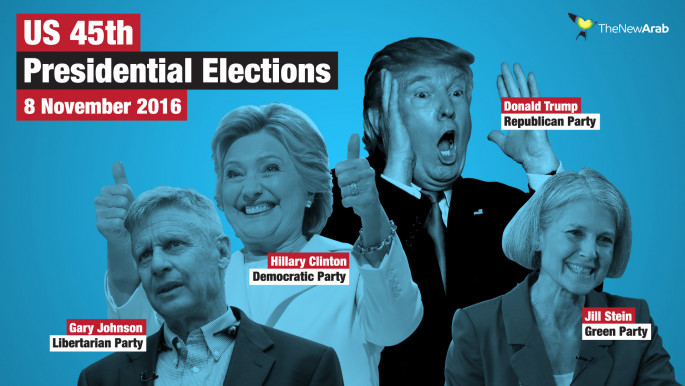Fight or flight: What if Trump wins?
"I love history and I try to pay attention to cues and messaging and look back at those who've utilised them in the past," he said in reference to statements made by Republican presidential candidate Donald Trump and other GOP candidates.
Trump's anti-Muslim positions - coupled with round-the-clock media coverage of his campaign have created a climate of fear and anxiety among many minorities in the US.
In mid-June 2015, Trump opened his bid for the country's top job with a speech in which he described Mexican immigrants as criminals, drug dealers and rapists.
In November, the billionaire claimed to have seen video footage of Muslims in New Jersey celebrating the September 11 terror attacks.
Meanwhile, Texas Senator Ted Cruz and several other Republican hopefuls spent a considerable amount of time cozying up to groups including the anti-Muslim Center for Security Policy, headed by Frank Gaffney.
However, Republican hate speech escalated and sharply focused against Muslims in the immediate aftermath of the deadly attacks in Paris in November and San Bernardino in December of last year.
Trump's response to the attacks was to call for a "total and complete shutdown" of Muslims entering the United States, while other GOP candidates competed to make the most outrageous statements about Islam and Muslims.
On December 15, during the first Republican presidential debate after the attacks, former Pennsylvania Senator Rick Santorum declared that Islam was not "a normal religion" and should not be afforded the same constitutional protections as other religions.
 |
I know that this is a reference people really hate, but the rise of the fascists during World War II was eerily similar to this. - Abdul Aziz |
 |
Santorum's comments went largely unchallenged by CNN's debate host, Wolf Blitzer, giving many Muslims around the country real cause for concern.
Since then, Trump has reiterated his plan to ban Muslims from entering the country, declared that "Islam hates us" - while retaining his popularity among Republican voters, winning the party's presidential nomination.
 |
|
| Donald Trump has been vitriolic in his rhetoric against Muslims, but that hasn't stopped him profiting from many business interests in the Middle East [Click to enlarge] |
"I know that this is a reference people really hate, but the rise of the fascists during World War II was eerily similar to this," Abdul Aziz told The New Arab.
"You had this demagogue who played on the fears of the populace and blamed all of their societal ills on the other - the other in this case being Jews - and we all know how that ended up."
The young entrepreneur explained that if a third party candidate or a fringe political figure was making these anti-Muslim statements, American Muslims would not bat an eye.
| Read more: Clinton takes poll lead as desperate Trump hints at 'assassination' |
However, given that Donald Trump's views seem to have the support of half the country's voting population, Muslims have a right to be extremely alarmed.
"Banning individuals and building walls are all things that Nazi Germany did," he added.
Since the start of campaigning in March 2015, there have been approximately 180 reported incidents of anti-Muslim violence, including 12 murders, according to a May 2016 report published by a George Town University research project.
Cases of anti-Muslim discrimination have also risen sharply during the campaign, with frequent reports of incidents involving Muslims or people perceived to be Muslim.
For many American Muslims, the latest upsurge of Islamophobia serves as a sign for things to come if Donald Trump enters the White House, which is why some have put contingency plans in place.
Fight or flight?
"In September of last year I started believing that Trump had a real chance at the presidency which is when I began exploring opportunities to live abroad," said Abdul Aziz, who lives between New Orleans, Louisiana, and Saint Louis, Missouri.
For Abdul Aziz - acutely familiar with the African American experience and the daily danger and anxiety experienced by black men in the American south - it is not a stretch to believe that bigots can come to power and introduce anti-Muslim legislation.
It was not too long ago that black people were legally treated as property and not allowed to vote until the laws were changed, and they can be changed again, he stressed.
"When you have a figurehead like Trump saying these things, obviously I have fear of secret police dragging me out of my house in the middle of the night," said Abdul Aziz, who has applied for residency in Morocco.
"The real danger lies in shrugging this rhetoric off because rhetoric is what got six million people killed in the Holocaust," he explained.
 |
There's a large swathe of America, including [among] people of colour, who view Muslims as permanently foreign and evil no matter what - Sara |
 |
Even people who do not identify as Muslim fear the possibility of a Trump presidency after witnessing the prejudice and hate his campaign has unleashed in various segments of American society.
"Even though I live in the 'liberal' Bay Area, I struggle with a lot of feelings of otherness," said Sara [not her real name], a 32-year-old atheist who lives in California's San Francisco Bay Area.
Sara believes that there has not been enough resistance to Donald Trump's rhetoric from white liberal Americans, which is why she fears for her safety if he were elected.
"I'm visibly not white, visibly 'ethnic' looking. I worry a lot about the sisters in hijab," said the young professional who was raised Muslim by her Pakistani immigrant parents. "I've had so many times in my life where 'allies' don't actually stand up or speak up.
 |
|
| Trump faces opposition from Hillary Clinton, Gary Johnson and Jill Stein [Clcik to enlarge] |
"There's a large swathe of America, including [among] people of colour, who view Muslims as permanently foreign and evil no matter what," she explained.
Sara told The New Arab that after one of the many Islamophobic upsurges of the past year, she decided to get her papers in order in case she needed to leave the country in a hurry.
"I was talking to a Jewish friend of mine who said she always has a small savings account to leave the country in an emergency. My friend was raised to be vigilant because of the Holocaust," said Sara.
"Right after that, there was a huge increase in the amount of anti-immigrant and anti-Muslim rhetoric - I had trouble leaving the house."
Sara acknowledged that, even if she left the United States, she would be trading one set of problems for another, especially since she is bisexual.
"At this point I'd just settle for not feeling scared and angry so much. I think maybe there are places where I could not have it be a daily thing," she said.
| Read also: Trump cites 'sacrifices', challenging fallen Muslim soldier's father |
Strength in faith
The New Arab spoke to Amina (also not her real name), a 65-year-old American Muslim of Jewish descent whose family had gone through the pogroms and the Holocaust.
Amina - who has lived in the American Southwest for more than 30 years - believes that American Muslims need to turn to their faith in order to get through the current toxic climate.
Amina told The New Arab that she has spoken to her family about what they would do if Trump were elected as president, and that she fears the possibility of facing a fate similar to her ancestors, but refuses to live in a state of fear and anxiety.
 |
This is not the worst it's been by far. It's only going to get better from here. - Imraan Siddiqi |
 |
"Sometimes that's gone through my head, and I try to dismiss it because I've been given so many tools and so many spiritual gifts to dispel those kinds of things and have trust that my lord is going to protect me," said the adherent of Sufism.
Imraan Siddiqi, the executive director of the Arizona chapter of the Council on American Islamic Relations, believes that, while some Muslims might decide to leave the country if Trump is elected, it is unlikely to trigger an exodus of any significance.
Siddiqi told The New Arab that Muslim civil rights groups were working in partnership with non-Muslim communities who have previously been affected by bigotry and prejudice to combat the latest wave of hate.
Siddiqi is also optimistic about the demographic realities of the United States, in which Latino, Asian-American and other communities are rapidly growing.
"This sort of nativism and anti-immigrant sentiment is disturbing, but is an attempt by some people to hold onto what they believe the country was like in the past," said Siddiqi. "However, the reality is that the country is heading in another direction."
"This is not the worst it's been by far. It's only going to get better from here."
Follow Mohammad Ali Musawi on Twitter: @malimusawi



